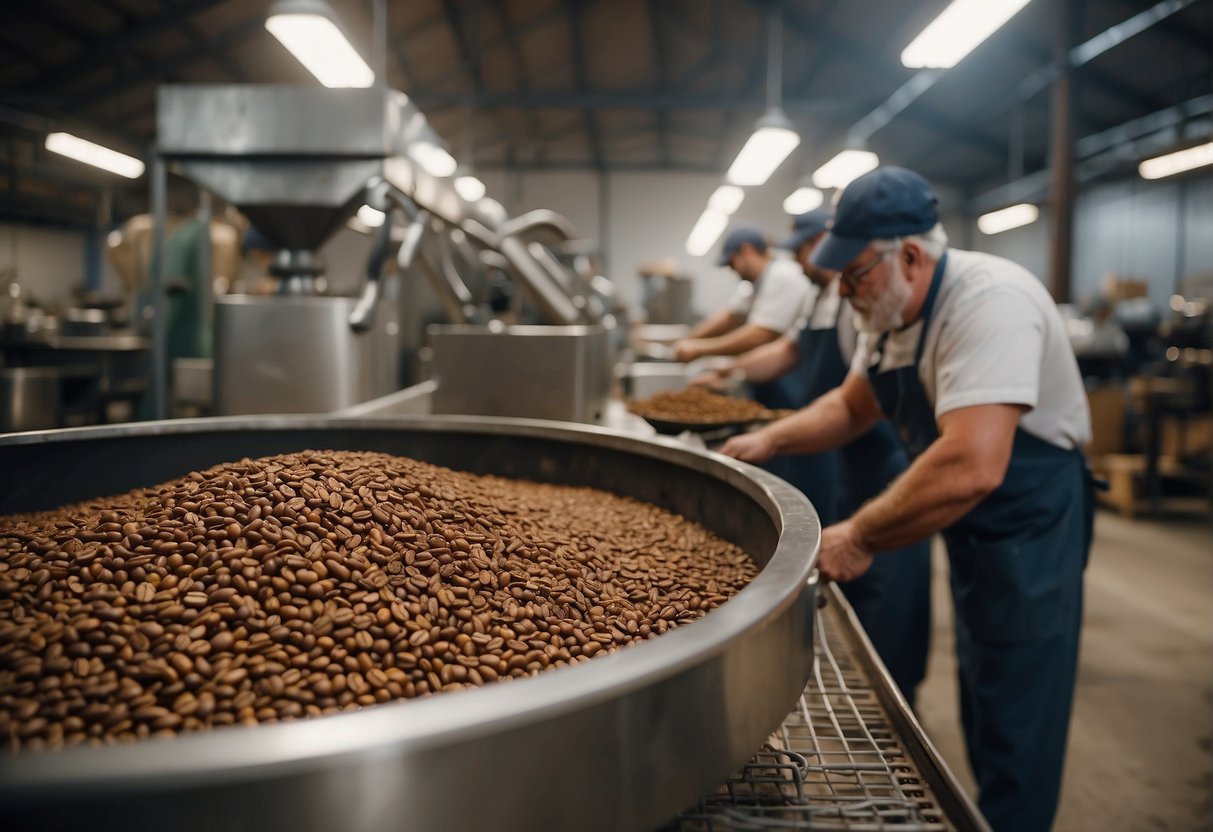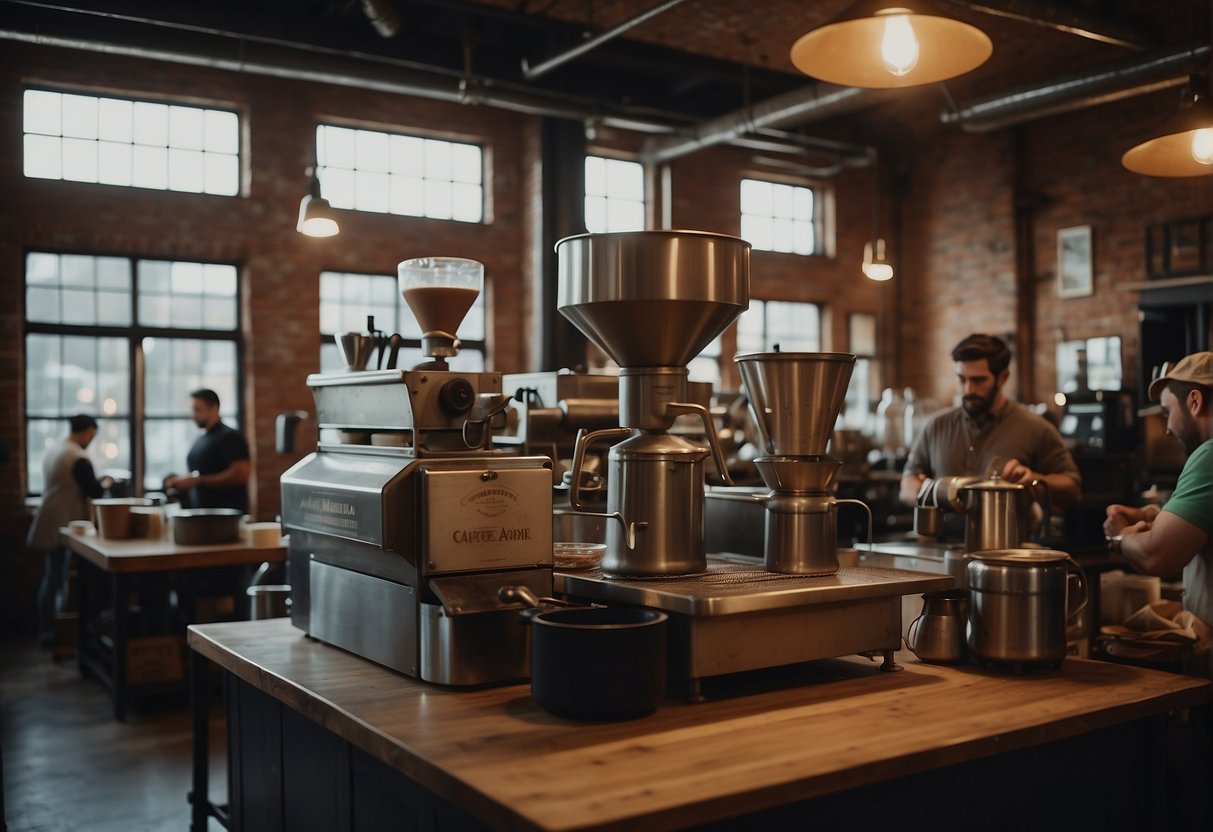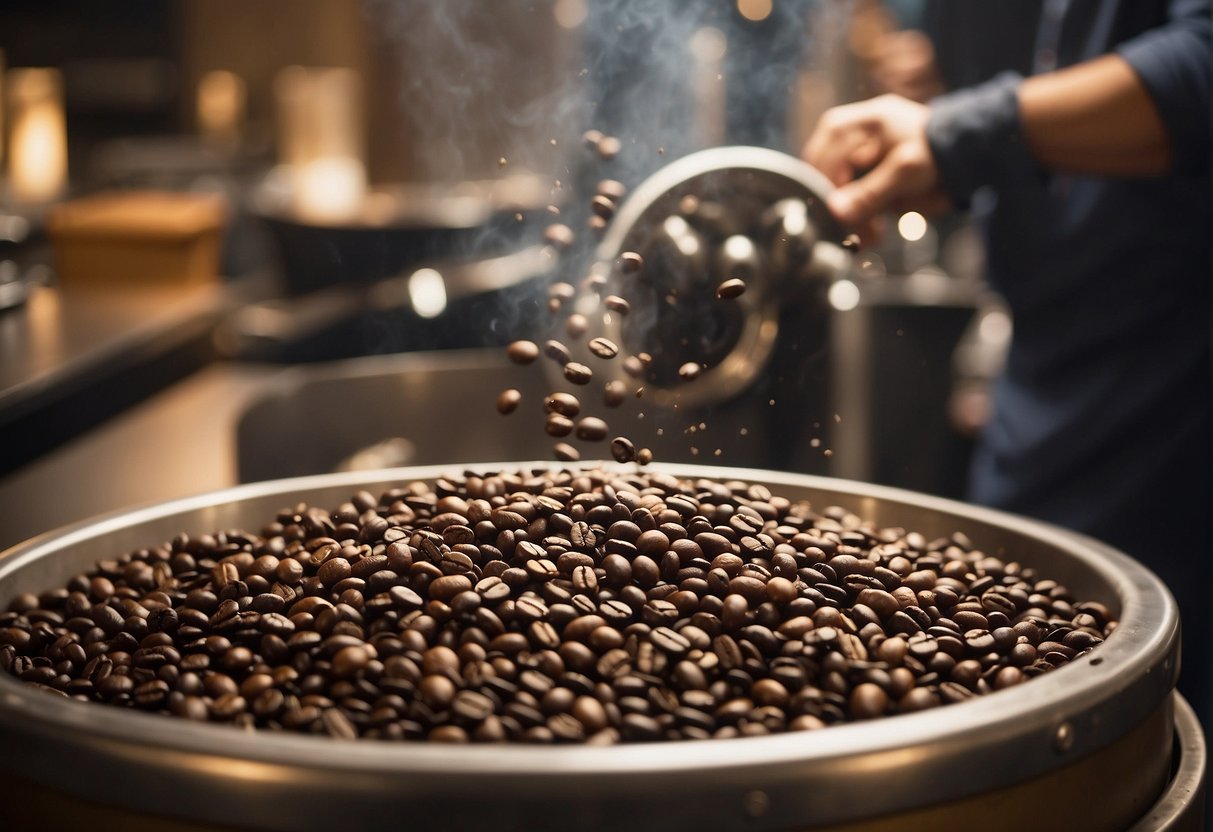Michigan’s burgeoning coffee scene is marked by a diverse collection of coffee roasters who are passionate about their craft. These artisans source high-quality beans from around the world, applying their expertise to roast them to perfection. The dedication to creating the perfect cup of coffee is evident across the state, from the shores of the Great Lakes to the bustling streets of Detroit. With a keen eye on sustainability and community support, Michigan’s roasters are not just selling coffee—they are enhancing the culture of their local communities.

The uniqueness of each Michigan roaster comes from their individual roasting processes, bean selection, and distinct flavor profiles they aim to achieve. Roasters like Ann Arbor Artisan Coffee Imports, Mighty Good Coffee Roasting Co., and RoosRoast Coffee exemplify the state’s commitment to coffee excellence. Their efforts contribute to a coffee culture that is rich, distinct, and highly regarded by coffee enthusiasts.
These coffee roasters in Michigan also reflect the state’s industrial ingenuity, transforming the simple coffee bean into an array of complex flavors that resonate with coffee lovers everywhere. Whether in a cozy cafe or through a local retailer, Michigan coffee is accessible to a wide audience, inviting both long-time residents and visitors to explore its many offerings. By fostering a sense of community and a shared love for coffee, Michigan’s roasters are a vital part of the state’s identity.
History and Culture of Michigan Coffee Roasters
https://www.youtube.com/watch?v=6jZJ5ekB4yg&embed=true
The Michigan coffee roasting scene has evolved with a rich blend of history and culture, shaped by passionate individuals and community support. In the early days, most local cafes in Michigan served rather generic coffee, with independent coffee roasters being a rarity until the mid-1990s. However, already present was Paramount Roasters in Lansing, producing coffee on a larger scale and boasting a legacy that stretched back a century.
The state has seen significant growth in the craft coffee sector, with pioneers such as Dessert Oasis Coffee Roasters making an impact. They represent passion for quality and the artistic side of coffee—a hallmark of Michigan’s coffee culture.
Another important player in this narrative is The Great Lakes Coffee Roasting Company. Starting off as an international coffee importer, they opened their first bar in a 130-year-old building in Detroit, bringing upscale, quality coffee to the forefront of the local scene.
Completing this trio of examples is Zingerman’s Coffee Company, a torchbearer for speciality coffee in Michigan. They are known for their dedication to coffee education and for serving expertly sourced and roasted beans.
Each entity reflects Michigan’s commitment to community and small business, ensuring that passion for coffee and entrepreneurial spirit continue to thrive. This framework has laid the groundwork for a thriving local coffee culture that is both diverse and dynamic, reflecting the state’s love for craft and community.
Top Coffee Roasters in Michigan

Michigan’s landscape is dotted with an array of coffee roasters, from classic establishments to modern innovators. Coffee lovers will find a rich tapestry of flavors and roasting styles across the state.
Ann Arbor’s Specialty Coffee Scene
Ann Arbor stands out as a hub for specialty coffee. Mighty Good Coffee sets a high standard with sustainably sourced beans and precise roasting techniques, while RoosRoast Coffee adds a distinctive local charm to their coffee offerings. Not to be missed, Hyperion Coffee Co. brings artisanal magic to every cup, and Espresso Royale graces the scene with their longstanding tradition of excellence in coffee roasting.
Grand Rapids’ Coffee Innovators
Grand Rapids is not just a city known for its art scene but also for its innovative coffee roasters. Madcap Coffee Company attracts coffee aficionados with its meticulously crafted roasts and dedication to quality. Meanwhile, Ferris Coffee takes pride in their storied history and diverse range of flavors. Grand Rapids Coffee Roasters offer a hands-on approach to their craft, encouraging visitors to experience the roasting process firsthand. Schuil Coffee Company, celebrating 40 years of roasting excellence, makes it clear that Grand Rapids is a must-visit for coffee lovers.
Unique Finds in Michigan’s Smaller Towns
Beyond the bigger cities, Michigan’s smaller towns are home to hidden gems in the coffee roasting world. Thumb Roast Coffee, located in the heart of the Thumb region, is notable for its emphasis on local culture and high-quality beans. In the Upper Peninsula, Velodrome Coffee brings a modern, cycling-themed twist to brewing. Downstate, Common Grace Coffee Co. serves up community spirit alongside their delicious roasts. Each small-town roaster contributes to Michigan’s reputation as a state serious about its coffee, with places like Leelanau Coffee Roasting and White Pine Coffee further enriching the local coffee landscape.
The Coffee Roasting Process

The coffee roasting process transforms green coffee beans into the aromatic, flavored beans ready for brewing. It involves careful bean selection, precise roasting, and diligent packaging.
Sourcing and Selecting Beans
Coffee roasters in Michigan often seek out high-quality, single origin beans, which are known for their unique flavor profiles that reflect their geographic origin. They meticulously source beans to ensure they meet specific taste expectations and quality standards. The selection process is critical, for it sets the foundation for the rich, characteristic flavors of the freshly roasted coffee.
Roasting to Perfection
The roasting process is where the magic happens—it’s a precise blend of art and science. Roasters in Michigan utilize a variety of roasting methods, often opting for small batches to maintain control and consistency. During roasting, the beans undergo a significant transformation, where the chemical compounds within are altered under high heat, leading to the development of complex flavor and aroma compounds.
- First Crack: This stage signifies when the beans have been roasted to a light level.
- Development: The time after the first crack is crucial; roasters adjust the duration to influence flavor and body.
Packaging and Distribution
Once the beans are roasted to perfection, they are quickly cooled and packaged to preserve freshness. Innovative packaging systems that include one-way valves to allow gases to escape without letting air in are commonly utilized. This ensures that consumers receive their coffee at peak freshness. The distribution is then carried out efficiently, to deliver the freshly roasted coffee to local cafes, stores, and sometimes directly to consumers.
Building a Coffee Community
In Michigan, coffee roasters and cafés are not just about the beans and beverages; they are pillars of local culture and socio-economic development. These establishments have become central to fostering connections and supporting the vitality of their communities.
Coffee Shops and Cafes as Social Hubs
Coffee shops and cafés, such as those highlighted in BD Barista School’s efforts, often serve as social hubs where people of diverse backgrounds come together. They offer a space for the community to connect, whether over a freshly brewed espresso or a local event. These venues blend the love for coffee with the desire to create a welcoming atmosphere, playing a significant role in the social fabric of Michigan’s towns and cities.
Supporting Local Businesses
Supporting local businesses is a value proudly shared by Michiganders. Cafés like Elizabeth Perk Coffee & Ice Cream that choose to serve locally roasted beans are investing in the state’s economy as well as its people. By these actions, they promote local entrepreneurship and sustainable practices, illustrating a commitment to the community and its growth.
Engagement Through Social Media
In today’s digitally connected world, coffee shops in Michigan are engaging with their customers through social media. Places like Great Lakes Coffee Roasting Company not only share ‘our story’ and ‘values’ online but also use platforms like Instagram and Facebook to create a dialogue with their patrons. Through these interactions, they build stronger relationships and a more engaged community.
Discovering Your Perfect Brew
When embarking on the journey to find the perfect cup of coffee, one must consider the diversity of coffee varieties and develop a keen sense for tasting.
Understanding Coffee Varieties
Coffee comes in countless varieties, each with its own profile of flavors and aromas. Single origin beans, for instance, are sourced from one specific location and are prized for their unique taste characteristics. A roaster like Sabbath Coffee Roasters, for instance, may provide a selection of single origin beans, allowing consumers to experience the distinct flavor notes that vary from region to region. Whether it’s a bold, chocolatey bean from Latin America or a fruity, acidic variety from Africa, the type of bean drastically alters the final cup.
- Latin American Beans: Notes of cocoa and nuts; balanced acidity
- African Beans: Fruity and floral; pronounced acidity
- Asian Beans: Earthy and spicy; full-bodied
The method of brewing, especially for an espresso, also heavily influences the experience. An espresso made from a single origin bean can exhibit a depth of flavor that’s both intense and refined.
The Art of Tasting Coffee
Tasting coffee, much like tasting wine, involves assessing aspects like aroma, acidity, body, and flavor. One begins by inhaling the aroma to identify any floral, fruity, or earthy notes. Following this, they should savor the coffee, letting it coat the palate to determine body—light, medium, or full—and acidity, which can range from a bright tanginess to a more subtle crispness.
- Aroma: Sniff to discern the profile—nutty, floral, fruity, etc.
- Body: Take a sip – is it light, medium, or full-bodied?
- Acidity: Look for the level of tanginess or smoothness.
- Flavor: Finally, identify the underlying flavors.
Through exploration and tasting, connoisseurs and casual coffee drinkers alike can discover their ideal brew, whether it’s a velvety espresso or a comforting cup of coffee made from expertly roasted beans. A knowledgeable approach to understanding coffee’s complex variety and savoring its flavors is essential in the pursuit of coffee perfection.
